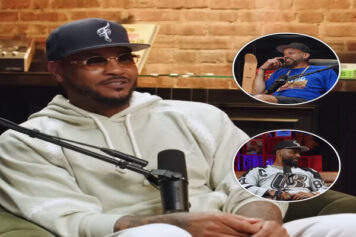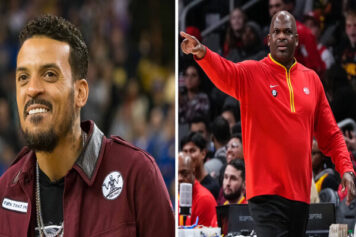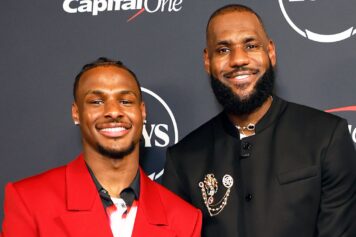Carmelo Anthony scored 28 points on 10-for-15 shooting, including 6 of 8 from three-point range, in Sunday’s Lakers win over the Memphis Grizzlies.
It was a historic night for Melo as he moved past Moses Malone into ninth place on the NBA’s all-time scoring list.
Late in the third with the Lakers down one, Melo was on the left side of the court with the Grizzlies’ Brandon Clarke guarding him. He had the ball, took two left-handed dribbles, elevated and let go a three that hit nothing but net.
Three to the dome. Vintage Melo.
Carmelo passes Moses Malone for ninth on the NBA's all-time scoring list 🙌 pic.twitter.com/TfUwVTk9c2
— NBA on ESPN (@ESPNNBA) October 25, 2021
It was just three seasons ago when Melo found himself out of the league after a 10 game stint with the Houston Rockets. The prevailing thought was Melo’s washed and it was time to retire.
Then came the Melo workout offensive. Videos of Melo getting buckets started popping up all over the internet. Despite what others may have thought, Melo believed he could still play and deserved to be on an NBA roster.
The Portland Trail Blazers gave him that chance in the 2019-2020 season and he played again for them last season before signing with the Lakers ahead of this season.
It’s very early in the 2021-2022 season, but Melo can still score and he looked great on Sunday. But it doesn’t matter what he’s doing in October. The question is can the Lakers count on him to produce consistently in April, May, and June.
To say Melo’s playoff work is limited would be an understatement. In 19 NBA seasons, he’s made the playoffs in 13 of those seasons. But he’s only advanced past the first round twice. His longest playoff run was way back in the 2008-2009 season when a 24-year-old Melo led the Nuggets to the Western Conference Finals.
Now at the age of 37, is this who the Lakers are counting on to be a key piece in a run to the title?
Yes, Melo can still hoop. He’s one of the best bucket getters in the history of this great game. On nights like last Sunday, he reminds us of what he has done and can still do on occasion.
But for the Lakers to win a title and hold off teams with younger stars in their primes ready for their chance, relying on Melo to replicate what he did on Sunday night versus what he’s done historically in the playoffs is not sound strategy.
In his two playoff runs with Portland he shot 41 percent from the field (bad) and 39 percent from three (very good), albeit in a limited sample size.
He had an eFG% (which adjusts for the fact that three points is one more than two) of 50 and a TS% (which measures shooting efficiency of twos, threes and free throws) of 54. Both below average.
That’s fine for someone playing spot duty or 10-12 minutes a night. But Melo averaged 29 minutes per game in the playoffs.
His WS/48, an estimate of the number of wins contributed by a player per 48 minutes, for Portland in the playoffs was -.001. The league average is about .100, according to Basketball Reference.
WS/48 in the playoffs in such a small sample size might be unfair. Looking at his seven playoff runs in Denver that number rises to .102, essentially league average. His TS% creeps up to 52.3.
Could Melo produce a night like Sunday in the playoffs? Sure. It’s possible. But in the playoffs, possible isn’t what you’re looking for.
How likely is something to occur consistently, on the biggest stage against the best competition? A vintage Melo night? Sure. A vintage Melo series? Not likely.



